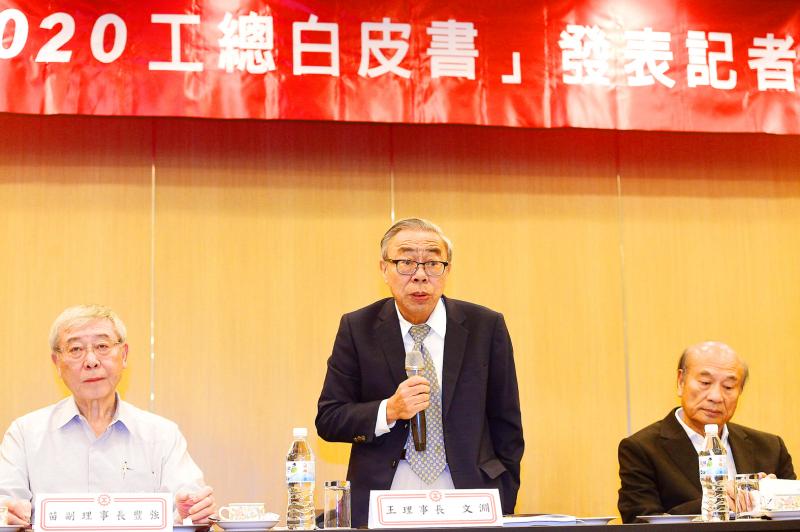-
By Crystal Hsu / Staff reporter
The government should pay serious attention to escalating US-China trade tensions, which are putting local firms at risk, as the two economies account for 60 percent of Taiwan’s exports, the Taipei-based Chinese National Federation of Industries (CNFI, 全國工總) said yesterday.
The trade group, which consists of 159 associations and represents a majority of local manufacturing firms, said it was concerned that firms might have to pick a side, when the best scenario would be to do business with both economies.
“The government must not take the trade tensions lightly, but should draw up effective, pragmatic policies to support local industries,” CNFI chairman William Wong (王文淵) told a news conference in Taipei after releasing the trade group’s annual position paper.

Photo: George Tsorng, Taipei Times
The theme of the paper this year focused on the fallout of the COVID-19 pandemic and the implications of what it called a “US-China cold war” over global technology dominance.
“US-China trade tensions have evolved from tariff disputes to all aspects of business, which could pose serious challenges for Taiwanese companies with deep participation in global supply chains,” said Wong, who is also chairman of the nation’s largest industrial conglomerate, Formosa Plastics Group (台塑集團).
Decoupling of the US and Chinese economies could throw existing global supply chains into disarray, causing realignment and business costs to skyrocket while increasing uncertainty for Taiwanese firms, although some companies would benefit from order transfers in the short term, Wong said.
Apple Inc is reportedly grooming a purely Chinese supply chain to make its products, cutting dependence on Hon Hai Precision Industry Co (鴻海), the largest assembler of iPhones.
The pandemic is another challenge that could push many local companies out of business, especially non-tech firms whose business order and profit margins are dwindling, CNFI said.
CNFI secretary-general Tsai Lien-sheng (蔡練生) said that government relief and stimulus measures are inadequate in scale and do not reach firms that are in need.
The government, while giving top priority to virus control, should set policy goals to help industries grapple with the pandemic crisis in the short term and brace for long-term development and transformation, Tsai said.
For example, policymakers can design distinct industrial clusters across Taiwan, which would help the nation pursue improved and more balanced development, Tsai said.
If possible, the government should retain nuclear power until renewable energy sources are sufficient and stable, CNFI said.
Comments will be moderated. Keep comments relevant to the article. Remarks containing abusive and obscene language, personal attacks of any kind or promotion will be removed and the user banned. Final decision will be at the discretion of the Taipei Times.

